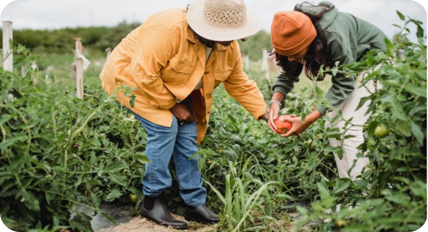Situation: Farm to school programs provide kids access to nutritious, high-quality, local food while creating market development opportunities for local farmers. Yet, not all local farmers have equal access to this economic opportunity. This is especially true of historically underserved farmers, a federal designation that includes Black, Indigenous, and People of Color (BIPOC); women; beginning farmers; and veterans, who are underrepresented in Wisconsin school food sales. Advancing racial and social equity in Wisconsin farm to school requires creating equitable access to farm to school markets. This study addresses a research need by identifying the most promising strategies for increasing historically underserved producers’ access to farm to school markets.

Response: A research team including Jess Guffey Calkins, Dane County Community Food Systems Educator, the UW-Madison School of Human Ecology, and REAP Food Group formed to examine this inequity (funded by a Wisconsin Idea Collaboration Grant). The study sought to better understand how Wisconsin’s historically underserved producers are participating in farm to school procurement, with a focus on understanding how to make their participation in school food supply chains easier and more profitable. In the spring of 2023, the team sent a statewide survey to historically underserved producers, and also held six focus groups. The team gathered 38 survey responses, and had 21 focus group participants (a representative sample size for this Wisconsin producer subgroup). Among survey participants, one in four historically underserved producers were selling to a Wisconsin K-12 school. Of the 28 respondents not currently selling to schools, 15% had sold their products to schools in their distribution area in the past, and 85% had not. All respondents who used to sell to schools in the past would be interested in doing so again. Of the 19 survey respondents who are not currently selling to schools, have not sold to schools in the past, and have not tried selling to schools, 89% are interested in selling to their distribution area. Overall, this demonstrates strong interest in accessing the farm to school market and indicates that barriers may be hindering access.
Results: Through in-depth conversations with producers and stakeholders, the team gathered data on barriers to accessing farm to school markets. The team then developed comprehensive recommendations for three stakeholder groups: Policymakers, Schools, and Support Organizations. This work has been shared and presented to statewide (and national) stakeholders and producers. Furthermore, research team members continue to collaborate in actively carrying forward these recommendations. This work served as the foundation for a statewide grant, “Growing Capacity and Connections for Hmong-Focused Farm to School” recently awarded to Extension’s Community Food Systems program.
The findings and recommendations are compiled in this report: Advancing Racial and Social Equity in Wisconsin Farm to School: Strategies for Investing in Historically Underserved Producers.
Evidence: Farm to school procurement offers a powerful opportunity for the state of Wisconsin to prioritize racial justice, economic development, and environmental sustainability. The barriers faced by historically underserved producers in accessing the farm to school market are unique, and the changes needed to address these challenges are equally specific. By providing a deeper understanding of the circumstances of historically underserved producers, and corresponding recommendations for change, the hope is that the findings of this study produce actionable results across the state.

By shifting the farm to school procurement model to one that supports “good food values,” Wisconsin can:
(1) Enhance the financial viability of small/mid-scale food enterprises that keep wealth circulating in community economies
(2) Create new opportunities for historically underserved food producers to access sizable, stable markets
(3) Ensure high quality nutrition for students of all socio-economic and racial backgrounds
“We hope this report is a call to action for policymakers, schools, producers, and farm to school support organizations to work collectively to maximize these benefits in communities across Wisconsin.”
Dr. Jennifer Gaddis, Associate Professor at UW-Madison




